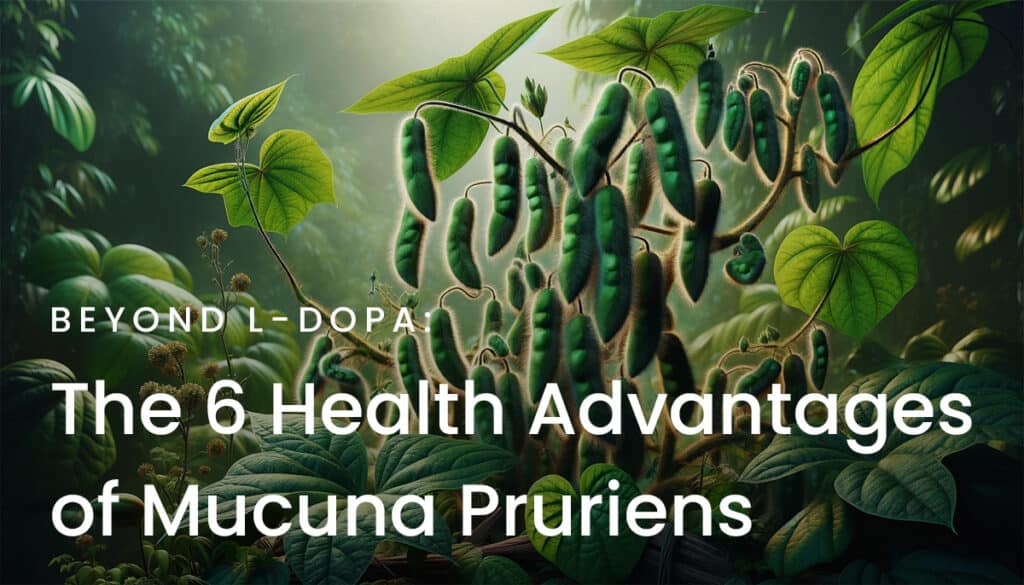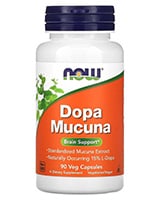

Mucuna pruriens, commonly known as velvet bean, is a tropical legume native to Africa and Asia. Traditionally used in Ayurvedic medicine, it has garnered attention for its high content of L-Dopa, a precursor to the neurotransmitter dopamine, crucial for brain function. This article delves into the health benefits of Mucuna pruriens, extending beyond its well-known application in Parkinson’s disease management, to uncover its multifaceted therapeutic potential.
Parkinson’s Disease Management
Mucuna pruriens has been a focal point of research for its application in Parkinson’s disease, a neurodegenerative disorder characterized by the decline of dopamine-producing neurons. The natural L-Dopa found in Mucuna pruriens is converted to dopamine in the brain, helping to alleviate symptoms of Parkinson’s such as tremors and movement difficulties. Studies suggest that the bioavailability of L-Dopa from Mucuna pruriens might be superior to that of synthetic forms[1]Pulikkalpura, H., Kurup, R., Mathew, P. J., & Baby, S. (2015). Levodopa in Mucuna pruriens and its degradation. Scientific Reports, 5, Article 11078. https://doi.org/10.1038/srep11078, offering a more natural and possibly more effective treatment option. Notably, research has demonstrated that Mucuna pruriens can provide relief from Parkinson’s symptoms with fewer side effects compared to conventional L-Dopa therapy, highlighting its potential as a viable alternative for patients.
Neuroprotective Effects
Beyond its application for Parkinson’s disease, Mucuna pruriens exhibits significant neuroprotective properties[2]Zahra, W., Birla, H., Singh, S. S., Rathore, A. S., Dilnashin, H., Singh, R., Keshri, P. K., Gautam, P., & Singh, S. P. (2022). Neuroprotection by Mucuna pruriens in neurodegenerative diseases. Neurochemical Research, 47(7), 1816–1829. https://doi.org/10.1007/s11064-022-03591-3. Its rich antioxidant content combats oxidative stress, a key factor in the development and progression of neurodegenerative diseases. Antioxidants neutralize free radicals, protecting neurons from damage and supporting brain health. Research into the neuroprotective effects of Mucuna pruriens has revealed its potential to not only safeguard neural cells but also to enhance cognitive functions, such as memory and reaction time, making it a subject of interest for preventing cognitive decline in aging populations.
Fertility and Sexual Health Enhancement
One of the notable health advantages of Mucuna pruriens is its role in improving fertility and sexual health, particularly among men. Studies have shown that supplementation with Mucuna pruriens can significantly enhance sperm quality[3]Shukla, K. K., Mahdi, A. A., Ahmad, M. K., Jaiswar, S. P., Shankwar, S. N., & Tiwari, S. C. (2010). Mucuna pruriens reduces stress and improves the quality of semen in infertile men. Evidence-Based Complementary and Alternative Medicine, 7(1), 137–144. https://doi.org/10.1093/ecam/nem171, including sperm concentration and motility, which are crucial factors for male fertility. This improvement is attributed to the high levels of L-Dopa in the plant, which influences the production of dopamine. Dopamine not only plays a key role in mood and pleasure but also has a direct impact on the hormonal regulation of the reproductive system. The aphrodisiac properties of Mucuna pruriens, long recognized in traditional medicine, have been validated by scientific research, offering hope for individuals seeking natural remedies for infertility and sexual dysfunction.
Antidiabetic Potential
Mucuna pruriens also exhibits promising antidiabetic potential. The presence of novel compounds in the plant, including natural L-Dopa, contributes to its ability to modulate blood glucose levels. Research indicates that Mucuna pruriens can aid in the management of diabetes[4]Pathania, R., Chawla, P., Khan, H., Kaushik, R., & Khan, M. A. (2020). An assessment of potential nutritive and medicinal properties of Mucuna pruriens: a natural food legume. 3 Biotech, 10(6), 261. https://doi.org/10.1007/s13205-020-02253-x by improving glycemic control, and reducing the risk of diabetes-related complications. Its action mechanism involves the regulation of insulin secretion and the enhancement of glucose uptake by cells, thereby stabilizing blood sugar levels. This makes Mucuna pruriens a subject of interest for its inclusion in holistic diabetes management strategies, highlighting its versatility beyond neurological applications.
Antimicrobial and Antivenom Activities
Mucuna pruriens is not just limited to treating chronic conditions but also exhibits significant antimicrobial and antivenom properties. Research has shown that extracts from the plant can inhibit the growth of various bacteria and fungi[5]Pathania, R., Chawla, P., Khan, H., Kaushik, R., & Khan, M. A. (2020). An assessment of potential nutritive and medicinal properties of Mucuna pruriens: a natural food legume. 3 Biotech, 10(6), 261. https://doi.org/10.1007/s13205-020-02253-x, attributing to its potential as a natural antimicrobial agent. This is particularly important in a world increasingly facing antibiotic resistance, as Mucuna pruriens offers an alternative or complementary solution to fighting infectious diseases.
Moreover, the plant has a long history of use in traditional medicine as an antivenom. Studies have validated its efficacy in neutralizing venom from several snake species[6]Kumar, A., Gupta, C., Nair, D. T., & Salunke, D. M. (2016). MP-4 contributes to snake venom neutralization by Mucuna pruriens seeds through an indirect antibody-mediated mechanism. Journal of Biological Chemistry, 291(21), 11373–11384. https://doi.org/10.1074/jbc.M115.699173, a property that can be life-saving in regions where snake bites are common and antivenom is scarce or expensive. The specific compounds within Mucuna pruriens responsible for this effect are believed to neutralize the enzymes and toxins present in snake venom, preventing them from causing harm. This dual antimicrobial and antivenom capability showcases Mucuna pruriens as a valuable resource for natural health remedies.
Mental Health Benefits
Mucuna pruriens extends its therapeutic benefits to the domain of mental health, offering relief for symptoms of anxiety and depression. The high content of L-dopa, which is a precursor to dopamine, plays a pivotal role in mood regulation and can alleviate feelings of depression and anxiety. Dopamine is essential for feeling pleasure, motivation, and maintaining mood balance. Studies have indicated that Mucuna pruriens can significantly impact mental well-being[7]Tavares, R. L., de Vasconcelos, M. H. A., Dutra, M. L. V., D’Oliveira, A. B., Lima, M. D. S., Salvadori, M. G. D. S., Pereira, R. D. A., Alves, A. F., do Nascimento, Y. M., Tavares, J. F., & Aquino, J. D. S. (2020). Mucuna pruriens administration minimizes neuroinflammation and shows anxiolytic, antidepressant, and slimming effects in obese rats. Molecules, 25(23), 5559. https://doi.org/10.3390/molecules25235559, making it a compelling natural treatment option for mental health issues.
The impact of Mucuna pruriens on mental health not only demonstrates its potential as an antidepressant and anxiolytic but also emphasizes the importance of natural substances in managing mental health conditions. Its use can be especially beneficial in individuals seeking alternatives to conventional pharmaceutical treatments, which may come with unwanted side effects.
Conclusion
Mucuna pruriens, with its diverse range of health benefits, stands out as a potent natural remedy that goes well beyond its traditional use for Parkinson’s disease. From enhancing fertility and sexual health to offering antidiabetic, antimicrobial, antivenom, and mental health benefits, this versatile plant has proven its worth in various aspects of health and wellness. As research continues to uncover the full scope of its therapeutic potential, Mucuna pruriens is poised to play an increasingly significant role in natural medicine, offering a holistic approach to health that aligns with the principles of prevention, protection, and healing.
Buy Mucuna pruriens Online Review Comparison Table
 Dopa Mucuna | iHerb | 90 pills (800mg) | $12.23 |  Worldwide, AU | Visit Website >> |
References
| ↑1 | Pulikkalpura, H., Kurup, R., Mathew, P. J., & Baby, S. (2015). Levodopa in Mucuna pruriens and its degradation. Scientific Reports, 5, Article 11078. https://doi.org/10.1038/srep11078 |
|---|---|
| ↑2 | Zahra, W., Birla, H., Singh, S. S., Rathore, A. S., Dilnashin, H., Singh, R., Keshri, P. K., Gautam, P., & Singh, S. P. (2022). Neuroprotection by Mucuna pruriens in neurodegenerative diseases. Neurochemical Research, 47(7), 1816–1829. https://doi.org/10.1007/s11064-022-03591-3 |
| ↑3 | Shukla, K. K., Mahdi, A. A., Ahmad, M. K., Jaiswar, S. P., Shankwar, S. N., & Tiwari, S. C. (2010). Mucuna pruriens reduces stress and improves the quality of semen in infertile men. Evidence-Based Complementary and Alternative Medicine, 7(1), 137–144. https://doi.org/10.1093/ecam/nem171 |
| ↑4, ↑5 | Pathania, R., Chawla, P., Khan, H., Kaushik, R., & Khan, M. A. (2020). An assessment of potential nutritive and medicinal properties of Mucuna pruriens: a natural food legume. 3 Biotech, 10(6), 261. https://doi.org/10.1007/s13205-020-02253-x |
| ↑6 | Kumar, A., Gupta, C., Nair, D. T., & Salunke, D. M. (2016). MP-4 contributes to snake venom neutralization by Mucuna pruriens seeds through an indirect antibody-mediated mechanism. Journal of Biological Chemistry, 291(21), 11373–11384. https://doi.org/10.1074/jbc.M115.699173 |
| ↑7 | Tavares, R. L., de Vasconcelos, M. H. A., Dutra, M. L. V., D’Oliveira, A. B., Lima, M. D. S., Salvadori, M. G. D. S., Pereira, R. D. A., Alves, A. F., do Nascimento, Y. M., Tavares, J. F., & Aquino, J. D. S. (2020). Mucuna pruriens administration minimizes neuroinflammation and shows anxiolytic, antidepressant, and slimming effects in obese rats. Molecules, 25(23), 5559. https://doi.org/10.3390/molecules25235559 |

Leave a Reply